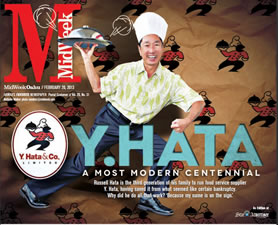Y.HATA – A Most Modern Centennial
“At its worst, the company was losing more than $300,000 a month, and for several years we were in negative equity,” Russell recounts. “We were bleeding.”
By the mid-1990s Y. Hata divested its non-food service businesses to focus on supplying restaurants and institutions.
In trading fated fortunes, Y. Hata also won a bid on the Sand Island warehouse that was in bankruptcy.
cover_3
“We moved in 1996, installed freezers a year later, and the flood-gates opened,” he says. “In 1997 we were awarded a military contract, the first time in more than 10 years that the company projected a profit.”
Asked why he went through so much to save the company, Russell is succinct: “Because my name is on the sign.”
As a wholesaler, Y. Hata is a middleman or link between manufacturers/suppliers and food service operators, such as chefs, food-and-beverage directors and kitchen operators.
“We’re a broadline distributor,” CEO Hata explains. “We supply everything a restaurant might buy except fresh seafood and produce. From cleaning supplies, dishes, tabletop items, to food, we have it all.”
Those are the tangibles. As one of Hawaii’s leading food-service distributors, it represents 9,000 line items from 400 manufacturers.
But what of intangibles like internal and external relationships that a corporation must align and nurture through good times and bad?
While the executives and managers hone Y. Hata’s operations to optimum efficiency, Russell orchestrates an overture of inspiration and motivation.
“Our first obligation is to our employees and customers,” Hata says. “Our employees are our sustainable competitive advantage.”
A strategic plan called Vision 2011 is a blueprint for cultivating a valued-based corporate culture. With the mission of “Foodservice beyond expectation,” Y. Hata, with $165 million in annual sales, wants to be the “distributor of choice” with “genuine concern for our partners’ success.”
When Hata came aboard, the company operated seven warehouses on Oahu, Maui and the Big Island. Today there is one each on those islands, and the operation is more efficient. Today it has operations on Oahu and the Big Island. Its distribution center on Sand Island Access Road runs 24 hours a day and boasts state-of-the-art systems.
“Our growth strategy known as the ‘Road to Haleiwa’ is a journey,” Hata states, “not merely a destination.”
When everyone’s onboard, the trip to profitability is faster and smoother, according to the 57-year-old CEO.
In turn, customers benefit from responsive customer service, value-added partnerships, and a level of trust that is as precious a commodity as inventory in the warehouse.
Revitalized Y. Hata has developed a number of firsts in Hawaii’s food distribution industry. Among them are technology-based management systems, activity-based costing, as well as unique organizational and sales support programs.
“We’re probably the most technologically advanced distributor in the state,” Hata says proudly.
Major investment also has gone into making Y. Hata a “green” environmentally friendly operation. Initiatives include sustainability programs such as electrical panels, a photovoltaic system, LED lighting and energy-efficient doors to reduce energy costs, resulting in a savings of 30 percent or $30,000 a year. The company has one of Hawaii’s largest photovoltaic solar systems installed by Sunetric two years ago. The $2.5-million system produces an average of 2,636 kilowatt hours of electricity each day, off-setting 22 percent of its current electricity usage.
Corporate responsibility extends to community causes. Y. Hata sponsors scholarships, has an internship program called DINE (Diversification, Innovation & Entrepreneurship) Apprentice, and recently enriched Kapiolani Community College with a $100,000 donation for its Culinary Institute of the Pacific project.
Y. Hata’s test kitchen, headed by executive chef Ernesto Limcaco, gives local chefs a venue to try to new products, train personnel, and consult with food specialists on menu planning and costing.
“Our hope is to be perceived as the best in the market,” Hata says. “That includes being top of mind with John Q. Public, from whom we must hire future workers.”
Typical of forward-thinking executives, Hata is mindful of both success and succession.
So the next time you see a Y. Hata delivery truck on the road, give the driver a shaka sign and smile. You’ll be saluting a 100-year-old tradition of delivering the goods.







